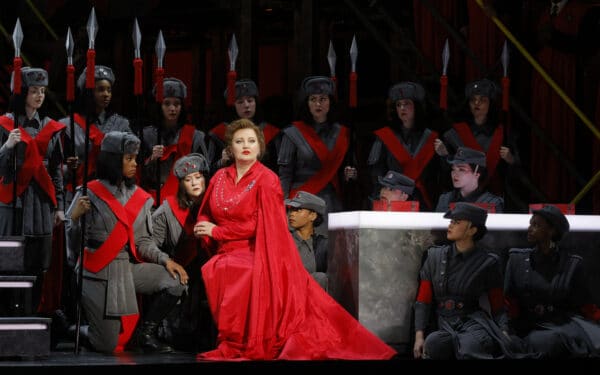A vast oblong of light and wasteland flashes up in front of you. In the centre, a woman is buried in the ground up to her waist, asleep. A bell sounds so loud you almost leap out of your seat, and the woman wakes. She is unperturbed by her barren surroundings, and she begins her day as usual, brushing her teeth, applying her makeup.
The woman’s name is Winnie, the central character of Samuel Beckett’s 1961 play Happy Days. The wasteland is a set at Riverside Studios, where the play is currently being performed. Lisa Dwan plays Winnie, and Trevor Nunn directs the play.
Happy Days is essentially a monologue. Winnie, who the script says is “about fifty”, whiles away her time reading the words on her tube of toothpaste out loud and describing the other seemingly ephemeral items in her handbag. Later, she can’t decide whether or not to sing or if it’s too early for her to put up her parasol.
From time to time, she stops to see how her husband is (he lives in a hole nearby, and we see him, or at least the back of his head, as he reads the newspaper and grunts his responses). It is strange. Dwan is wonderfully fidgety in the role, all manic smiles and forever interrupting herself, a tinge of madness about her.
There is no recognisable action at all, which is bound to frustrate some. In fact, it seems wrong to class a play like Happy Days as “entertainment”. You don’t feel warm and fuzzy inside upon having seen it, there are no show tunes or jump scares (apart from the bell).
Beckett was as interested in philosophy as he was in art, which is consistently reflected in his work. His plays are confusing; they demand that the audience thinks hard about life and the world. Put simply, they are not for everyone.
I am not even sure that Beckett dealt in allegories. With Happy Days, the inevitable question is, “What does it all mean?”; In our minds, we scrabble about for some finite thing to think and say about it, something to cling on to, something that reassures us amidst the sheer strangeness of it all.
But there is almost certainly not a central, prevailing metaphor that the audience is meant to “get”, and I suspect that Beckett would have been suspicious of that type of thing in theatre – too reductive, too neat and therefore so very unlike human existence, which he saw as a chasm of ignorance and confusion. You can understand why Beckett’s work is sometimes called bleak.
His outlook on life was not optimistic, not in the traditional sense at any rate. I wonder then if the real value of this type of art is in the space it allows the audience to take from it what they will, to perceive things in it that gets them thinking, reevaluating perhaps, and – hopefully – discussing, debating with others.
The actor Patrick Magee, who was a great friend of Beckett’s, once told an interviewer that, “if you don’t make the distinction between the theatre as entertainment and the theatre as an almost scientific exploration of man, [then] you miss the point of Beckett”.
Happy Days is thoroughly ambiguous. It does not satisfy us in the way that more conventional theatre styles aim to, but if it provokes conversation and argument, if it serves as a kind of springboard, then it is doing something important.
My own take is that the play is, in part, an examination of what it is to be middle-aged. Inevitably, so much of our culture celebrates the vibrancy and wonders of youth, and we seem more willing now, I think, to contemplate the aching sadness of old age (see The Father, the recent Oscar-winning film in which Anthony Hopkins plays a man with progressing dementia). But what of the bits in between, the fifties and sixties? We are less sure of ourselves here; we aren’t certain of what we should feel.
The middle-aged seen on television and in the newspapers are often hugely successful, but they are hardly representative. For most people, it is a complicated time in life, as they slowly realise the extent of the things they have and have not achieved. And yet there are still years and years, decades in some cases, left to be lived.
At Riverside Studios, the intensity of Dwan’s performance is such that her Winnie seems truly tormented by these dilemmas, and the cracks show here and there in expertly placed subtleties. Her voice breaks a little, she touches her face and stares into the middle distance. But still, she talks and talks, as if to go silent would be to admit defeat.
Beckett was fascinated by the concept of growing old. Despite the great pains of nostalgia and regret, most people still choose to live as long as they possibly can, even when things seem unbearable. The final words of his 1958 novel The Unnamable are, “I can’t go on, I’ll go on.”
Perhaps, then, this is a kind of optimism, a paean to perseverance and the enduring strength of the human spirit. But perhaps you will see it differently.
Dwan is superb throughout as Winnie, full of sadness and longing and yet still determined to “go on”, telling herself again and again that “this is a happy day”.
The play is not a happy watch, but that isn’t the point. It’s difficult, frustrating and confusing, and yet, at the same time, it’s something special, beautiful even.




